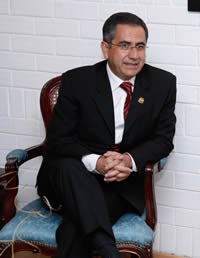Q&A with Mayor of Quito, illustrating the Safe Cities programme
Date:
As leaders gathered at the World Urban Forum in Naples, UN Women spoke to the Mayor of Quito, one of the cities trying to become violence-free through the Safe Cities programme.
Interview with the Mayor of Quito Dr. Augusto Barrera
In your capacity as Mayor, what message from your male and female citizens have you brought to the World Urban Forum?

Cities are the result of a collective endeavour. They are a complex formation, of public forums in which men, women, and children interact as a society and forge an urban future, in the spirit of freedom and respect for diversity. Building a community in which life is lived to the fullest pre-supposes that in cities the general interest prevails over the individual interest. In Quito we are experiencing transformations that are, in fact, more important, we are building a city that is equitable, united, sustainable and inclusive.
And with regard to your peers, the mayors of other cities, what message do you bring to them based on your experience in building a city that is free of violence for women and girls?
Combating gender violence in our countries is a struggle about which we should all be proactive, irrespective of gender. Those of us like myself who have the honour and the responsibility of directing the destinies of a city, should on a daily basis back the undertaking to guarantee unimpeded exercise of civil rights through a raft of solutions that are innovative, informed but, above all else, developed collectively.
The right to a life that is free of violence is a right that benefits all of us: women, girls and men—because it makes us think in a new and radical way about the relationships between human beings with a view to ensuring that communal areas in the cities are more democratic, more egalitarian and more human.
Cultural changes are more difficult to achieve in a society and the realization of such goals should be the obligation of all those who work towards ensuring a life that is better, more dignified, and that provides living conditions that are more equal.
What has changed in the city since the time during which the municipality has incorporated the “safe city focus in its policies and legislation? Could you give us a concrete example of how women and girls live better in cities that are committed to the eradication of violence and sexual harassment?
Our policy is zero tolerance for sexual violence; the right to a life that is free from violence is a commitment that involves the whole of the municipal structure.
At the level of political decision-making the Commission for Equality and Gender of the Metropolitan Council is in operation-this has been working in the regulatory environment through the issuance of Decrees regarding policies for eradicating gender violence.
At the operational level we see the administrations for each district, offices that have responsibility for implementing policy in territories. At present we have worked in two of the eight district administrations, these being the most densely populated and in which the problem required urgent action. In the pursuit of this objective, community participation has been of key importance in addressing the problem and modifying violent and abusive behaviours.
In the Municipality of Quito we have risen to the challenge of eradicating sexual violence both within the sphere of the transport system and in public spaces and this achievement is also reflected in the allocation of resources and the creation of Centres for Equity and Justice (centres that attend to the needs of citizens and that are decentralized and equipped to facilitate access to justice as well as addressing and preventing gender violence).
In what ways are the various social stakeholders such as the mass media, companies, citizens participating in ensuring that Quito becomes safer and free from violence towards women and girls?
From the vantage point of the municipality we have identified key participants such as women's organizations, as well as grassroots and community-based organizations. We have brought together various divisions of the municipality such as the metropolitan police, our mass media and our service divisions, so that they can disseminate information so that this issue of violence towards women can be dealt with to the greatest possible extent through the forums for social interaction. An overriding concern has been to reclaim public environments so that these can at last be truly safe, and we have also been diligent in changing the public perceptions that lead to repeated acts of violence; in other words, we work to bring about a cultural shift, a radical change in men and women with a view to achieving a relationship that is more democratic and more humane.